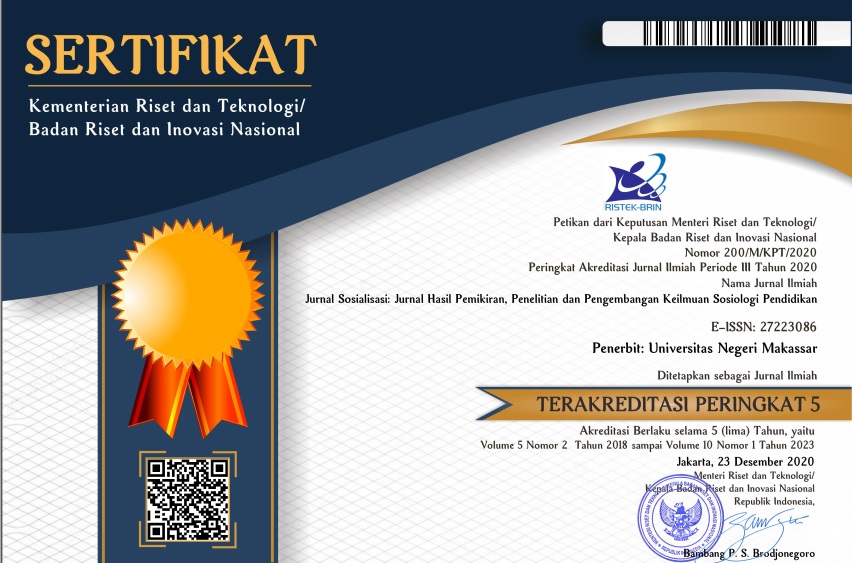Gender Based Violence in Botswana: A Moral Perspective
(1) University of Botswana
(*) Corresponding Author
DOI: https://doi.org/10.26858/sosialisasi.v1i3.38627
Abstract
This paper discusses two moral theories with the aim of arguing against gender-based violence (GBV) in Botswana, particularly violence against women (VAW). The first moral theory is the African ethic of Ubuntu/botho according to which actions are right insofar as they promote harmonious relationships where people can live in solidarity with one another. The second is Immanuel Kant’s moral theory according to which actions are right provided they are done purely from duty, otherwise they are wrong. After spelling out the tenets of each theory, the paper applies it to instances of GBV to show that it is essentially morally wrong. More specifically, the paper employs these moral theories to demonstrate that GBV violates human dignity of its victims; that it undermines their health, security and autonomy. This paper uses the method of critical and conceptual analysis which consists in analyzing concepts or ideas to understand their meanings.
Full Text:
PDFReferences
Adorno, R. (2014). Human Dignity and Human Rights. In H. Ten Have & B. Gordijn (Eds.), Handbook of global bioethics (pp. 45–57). Springer Dordrecht Heidelberg.
Aina, O. (1998). Women, Culture and Society. In A. Sesay & A. Obidebiyi (Eds.), Nigerian Women in Society and Development (pp. 3–32). Dokun Publishers.
Binsbergen, W. M. J. van, Studiecentrum, A., & Staf, O. (2001). Ubuntu and the globalisation of Southern African thought and society. Http://Hdl.Handle.Net/1887/9456.
Bramer, M. (2011). Domestic Violence as a Violation of Autonomy and Agency: The Required Response of the Kantian State.
Cochrane, A. (2010). Undignified bioethics. Bioethics, 24(5), 234–241. https://doi.org/10.1111/j.1467-8519.2009.01781.x
Coker, A. L., Sanderson, M., Fadden, M. K., & Pirisi, L. (2000). Intimate partner violence and cervical neoplasia. Journal of Women’s Health and Gender-Based Medicine, 9(9), 1015–1023. https://doi.org/10.1089/15246090050200051
Costello, S. (2015). Female genital mutilation/cutting: Risk management and strategies for social workers and health care professionals. In Risk Management and Healthcare Policy (Vol. 8, pp. 225–233). Dove Medical Press Ltd. https://doi.org/10.2147/RMHP.S62091
Cureton, A. (2013). From Self-Respect to Respect for Others. Pacific Philosophical Quarterly, 94(2), 166–187. https://doi.org/10.1111/j.1468-0114.2012.01450.x
Dillon, R. S. (2018). “Respect.” The Stanford Encyclopedia of Philosophy.
Gaie, J. B. R. (2007). The Setswana Concept of Botho: Unpacking the Metaphysical and Moral Aspects. In J. B. R. Gaie & S. Mmolai (Eds.), The Concept of Botho and HIV & AID in Botswana (pp. 29–43). Zapf Chancery.
Gender Links Botswana and Women’s Affairs Department. (2012). Gender Based Violence Indicators Study Botswana.
Gewirth, A. (1998). Self-Fulfillment. Princeton University Press.
Kant, I. (1996). Practical Philosophy (M. J. Gregor (ed.); 1st ed.). Cambridge University Press.
Koenane, M. L. J., & Olatunji, C. M. P. (2017). Is it the end or just the beginning of ubuntu? Response to Matolino and Kwindingwi in view of Metz’s rebuttal. In South African Journal of Philosophy (Vol. 36, Issue 2, pp. 263–277). Philosophical Society of Southern Africa (PSSA). https://doi.org/10.1080/02580136.2016.1225188
Kroeber, A. L., & Kluckhohn, C. (1963). Culture: a critical review of concepts and definitions. Peabody Museum of Archaeology & Ethnology, 47(1).
Letourneau, E. J., Holmes, M., & Chasedunn-Roark, J. (1999). Gynecologic health consequences to victims of interpersonal violence. Women’s Health Issues, 9(2), 115–120. https://doi.org/10.1016/S1049-3867(98)00031-0
Macklin, R. (2003). Dignity is a useless concept. In British Medical Journal (Vol. 327, Issue 7429, pp. 1419–1420). https://doi.org/10.1136/bmj.327.7429.1419
Matolino, B., & Kwindingwi, W. (2013). The end of ubuntu. South African Journal of Philosophy, 32(2), 197–205. https://doi.org/10.1080/02580136.2013.817637
METZ, T. (2010). AFRICAN AND WESTERN MORAL THEORIES IN A BIOETHICAL CONTEXT. Developing World Bioethics, 10(1), 49–58. https://doi.org/10.1111/j.1471-8847.2009.00273.x
Ministry of Basic Education. (2016). Second Botswana Youth Risk Behavioural and Biological Surveillance Survey Report.
Mwaura, P. N. (2010). Gender Based Violence: A Pastoral Challenge for the Church in Africa. Journal of Constructive Theology , 16(1), 102–119.
Phorano, O., Nthomang, K., & Ntseane, D. (2005). Alcohol abuse, gender-based violence and HIV/AIDS in Botswana: establishing the link based on empirical evidence. SAHARA J : Journal of Social Aspects of HIV/AIDS Research Alliance, 2(1), 188–202. https://doi.org/10.1080/17290376.2005.9724842
Rachel, J., Purna, S., & Claudia, G.-M. (2002). Sexual Violence. In G. K. Etienne, L. D. Linda, A. M. James, B. Z. Anthony, & L. Rafael (Eds.), World Report on Violence and Health (pp. 147–174). World Health Organization .
Saleh, A. M. (2018). Gender Based Violence.
Schroeder, D. (2010). Dignity: One, two, three, four, five, still counting. Cambridge Quarterly of Healthcare Ethics, 19(1), 118–125. https://doi.org/10.1017/S0963180109990302
Sulmasy, D. P. (2007). Human dignity and human worth. In Perspectives on Human Dignity: A Conversation (pp. 9–18). Springer Netherlands. https://doi.org/10.1007/978-1-4020-6281-0_2
Taylor, D. F. P. (2014). Defining ubuntu for business ethics- A deontological approach. South African Journal of Philosophy, 33(3), 331–345. https://doi.org/10.1080/02580136.2014.948328
Timmermann, J. (2006). Kantian Duties to the Self, Explained and Defended. Philosophy, 81(3), 505–530. https://doi.org/10.1017/S0031819106317056
UN General Assembly. (1993). Declaration on the Elimination of Violence against Women.
UNAIDS. (2017). ENDING AIDS - Progress towards the 90–90–90 targets.
UNFPA. (2008). Strategy and Framework for Action to Addressing Gender-based Violence. United Nations.
UNODC. (2010). Handbook on Effective police responses to violence against women.
Wadesango, N., Rembe, S., & Chabaya, O. (2011). Violation of women’s rights by harmful traditional practices. In Anthropologist (Vol. 13, Issue 2, pp. 121–129). Kamla-Raj Enterprises. https://doi.org/10.1080/09720073.2011.11891187
World Health Organization., & World Bank. (2011). World report on disability. World Health Organization.
Article Metrics
Abstract view : 187 times | PDF view : 33 timesRefbacks
- There are currently no refbacks.

This work is licensed under a Creative Commons Attribution 4.0 International License.


































